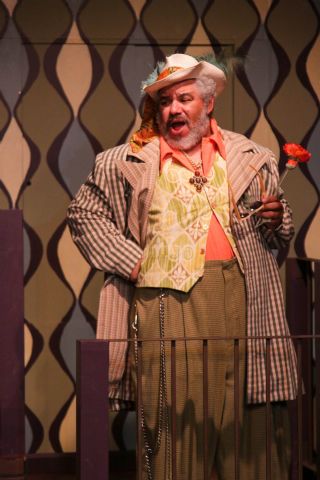|
Symphony
FROM THE NEW WORLD TO THE OLD WORLD
by Peter Lert
Saturday, June 14, 2025
Chamber
MC2 DUO RECITAL CLOSES 222'S SEASON
by Terry McNeill
Saturday, June 14, 2025
Choral and Vocal
CANTIAMO SONOMA'S LUSCIOUS A CAPELLA SINGING IN SEASON ENDING CONCERT
by Pamela Hicks Gailey
Sunday, June 8, 2025
Symphony
SRS SEASON ENDS WITH RESOUNDING TA-TA-TA-BANG
by Terry McNeill
Sunday, June 1, 2025
Symphony
YOUTHFUL VIRTUOSITY ON DISPLAY AT USO'S MAY CONCERTS
by Peter Lert
Saturday, May 17, 2025
Symphony
MYSTICAL PLANETS AND LIVELY GERSHWIN ORTIZ AT FINAL SRS CONCERT
by Peter Lert
Sunday, May 4, 2025
Symphony
VSO'S CONCERT MUSIC OF TIME, MUSIC OF PLACE
by Peter Lert
Sunday, April 27, 2025
VOCAL ELEGANCE AND FIRE AT THE 222'S RECITAL APRIL 26
by Pamela Hicks Gailey
Saturday, April 26, 2025
CANTIAMO SONOMA SINGS AN INSPIRED GOOD FRIDAY MOZART REQUIEM CONCERT
by Pamela Hicks Gailey
Friday, April 18, 2025
DRAMATIC SHOSTAKOVICH SYMPHONY CLOSES PHILHARMONIC'S 25TH SEASON
by Terry McNeill
Sunday, April 13, 2025
|
 |
 Jo Vincent Parks as Sir John Falstaff June 12 (E. Chazankin Photo) |
SIR JOHN'S VISUAL FEAST IN CINNABAR THEATER FALSTAFF PRODUCTION
by Terry McNeill
Saturday, June 13, 2015
Verdi’s operas tend to have a visceral impact on listeners, the connection forged by emphasizing starkly realistic human emotions and glorious tunes for singers and richly hued orchestra writing. But not in his last opera written in 1893: Falstaff.
In only the Italian master's second comedy, Falstaff can seem at well over two hours drawn out and lacking the catchy melodies of the operas Rigoletto, Aida or Ernani. Petaluma’s Cinnabar Theater production began June 12, running for nine performances to June 28, and on opening night overcame the familiar with a brilliantly conceived production that featured theatrical rather than musical splendor. It was a different kind of Falstaff.
The cast was strong, led by Jo Vincent Parks as the insouciant Sir John, Eileen Morris’s Alice Ford, veteran Cinnabar artist William Neely as Alice’s husband, Krista Wigle as Mrs. Quickly, and Scott Joiner and Aurélie Veruni as the young lovers Fenton and Nannetta. And the production was large, combining 23 singing roles with a 12-piece orchestra conducted by Cinnabar Music Director Mary Chun.
Sonic balances through the three acts in the small hall were mostly good, the orchestra occasionally covering the singers, but never Mr. Parks stentorian baritone, Ms. Morris’ soprano or Mr. Neely’s paced and agile baritone. In many ways the women’s roles upstaged those of the men, and Ms. Wigle and Kim Anderman (Meg) added as much comedy as Mr. Parks with his pratfalls and pomposity, and his groupies Bardolf and Pistol (Ted Zoldan and Sepp Hammer). Throughout the opera Falstaff is pummeled, derided, thrown into a huge laundry basket, and finally unceremoniously tossed into the river after being constantly tricked by four savvy women that know the territory far better than he does. But in Mr. Park’s interpretation he survives physical and emotional upsets to achieve a small triumph, where at the end he declaims the world is folly and people are simply figures of mirth.
In this unique production, the first Falstaff on the North Coast in many years, there is a novel development. Stage Director Elly Lichenstein has fashioned a glittering visual drama, full of busy choreography and vaudeville touches, but as the acts unfold the opera’s core impact moved from the audio to the visual. The subtlety of Verdi’s urbane music faded into to the background of farcical revelry and evocative stage sets. The secretive sliding windows in the back wall location allowed pungent vocal “asides” to be rapidly delivered and kept interest centered on the dramaturgy and Sir John's foolish amorous ambitions.
This is not to say the beguiling score was not well presented, as Ms. Chun deftly controlled the string sound and contrasting colors from percussion, winds and even chimes (12 of them) when Falstaff in costume is moving to an anticipated assignation with Alice Ford. First violinist Claire-Jeanne Martin played graceful solos, string tremolos and horn calls highlighted the drama, and Steven Hoffmann (bass viol) and keyboardist Michael Anthony Schuler provided sonorous continuo support.
Costumes in this production, designed by Lisa Eldredge, were exemplary and especially extravagant in Scene Two of the Third Act and worn throughout by Mr. Parks and Ms. Wigle. They were delightfully outrageous costumes, in the Cinnabar tradition, as the production set in the 1950s featured bright orange, pink and blue tints on dresses, pants and even shoes.
Eileen Morris in the role of Alice was an organizing force in the group conspiring to bring Sir John Falstaff to his comeuppance, and she captured the bit of devil in the role. The part of Meg is not so prominent, though Ms. Anderman aided Ms. Wigle in moving the uninhibited slapstick forward. It was a performance without extended arias, save for Mr. Neely's Act 2, Scene 1 solo, Mr. Joiner’s lyrical singing that began Act 3, and Ms.
Veruni's fetching "Queen of the Fairies" aria in Act 3.
Cinnabar has a sparkling history of adding new twists to conventional opera plots, always in English, and connecting trenchantly with the audience. This Falstaff production meets a high professional standard and the packed opening-night audience applauded with gusto.
|

